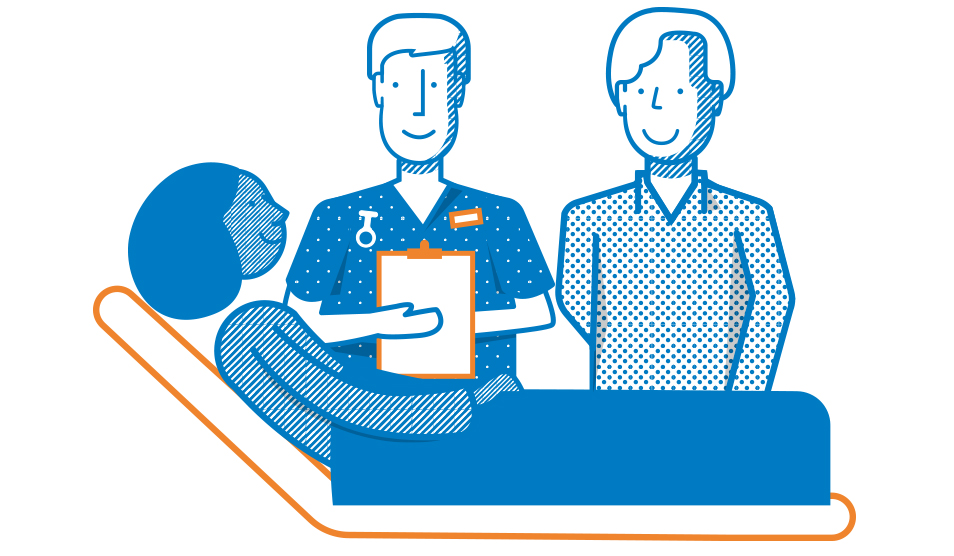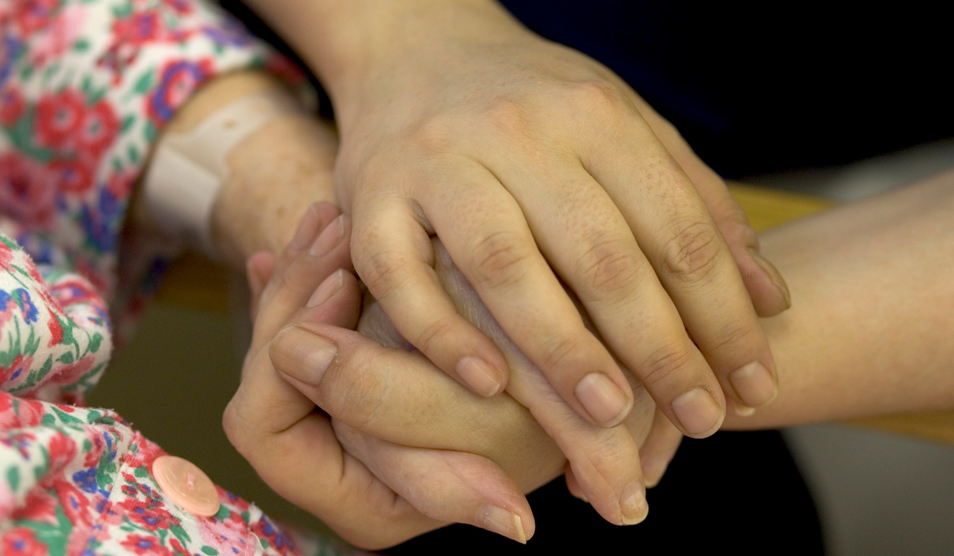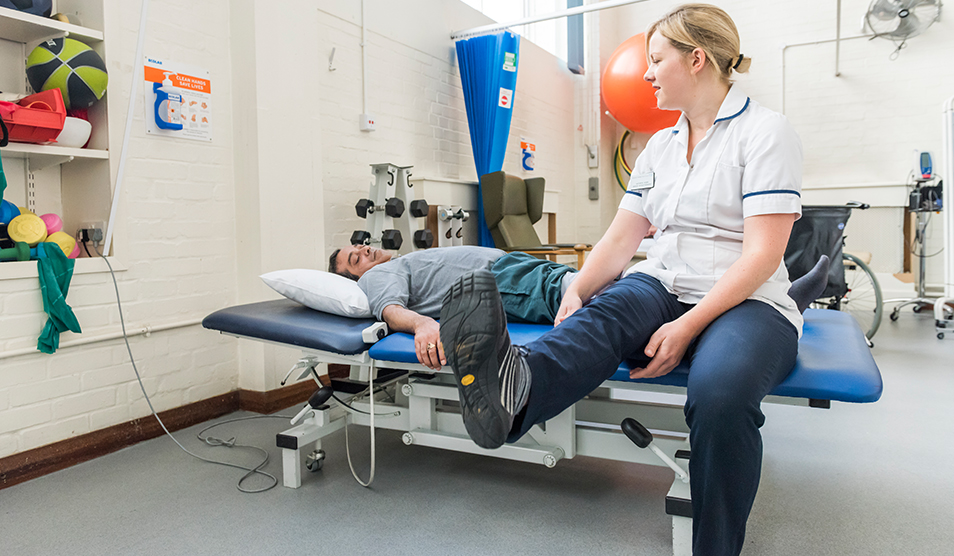Physiotherapy
Locations
-
Charing Cross Hospital
-
Hammersmith Hospital
-
Queen Charlotte's and Chelsea Hospital
-
St Mary's Hospital
Visitor Information
Translation help:
To translate this page into your preferred language, click the Google Translate icon in the top-right menu and select your desired language.
Our physiotherapy service provides rehabilitation for inpatients and outpatients at Charing Cross, Hammersmith, Queen Charlotte’s & Chelsea and St Mary’s hospitals and various community locations.
Treatment may include education, advice and exercise to maximise independence and self-management strategies. The inpatient service provides expert physiotherapy assessment, treatment and advice for all inpatients that require physiotherapy to facilitate recovery following acute illness or surgery and to facilitate discharge home or onward referral for rehabilitation.
The outpatient service receives referrals from Imperial College Healthcare NHS Trust consultants for patients requiring expert physiotherapy assessment and treatment and for rehabilitation after surgery.
Conditions and treatments
We offer inpatient physiotherapy services within all speciality areas provided by the Trust. Our physiotherapists are allocated to specific wards according to the specialty skills of each therapist. All hospital departments can discuss the specific physiotherapy needs of a patient with their ward-based therapist and referrals for physiotherapy will be responded to within 24 hours. Our physiotherapists attend the board rounds and multidisciplinary team meetings on the wards to assist our medical teams in the planning of on-going care. All patients are assessed by a Health & Care Professions Council registered physiotherapist and treatment is individually tailored to the patient's needs.
Inpatients
The service will accept referral for inpatients with any presenting condition if physiotherapy would benefit the patient, including:
- orthopaedics – trauma and elective surgery
- respiratory – acute and chronic respiratory disorders and critical care
- stroke and adult neurology/neurosurgery
- neuro-rehabilitation
- major trauma – head injuries and multiple fractures
- elderly medicine – patients that have fallen or have mobility problems
- obstetrics
- gynaecology
- cancer
- vascular and amputees
- renal
- children's services
Outpatients
We offer outpatient services for:
- musculoskeletal conditions e.g. back and neck pain, other joint pain, soft tissue injuries
- post-orthopaedic surgery
- rheumatology conditons
- chronic pain
- vestibular disorders
- hand therapy
- intermittent claudication – classes
- amputees – prosthetic rehabilitation
- obstetrics – antenatal and postnatal assessment, treatment and advice for back pain, continence and urogynaecological problems
- gynaecology – conservative management for women with continence and urogynaecological problems
- advanced practitioner service in orthopaedic clinics, pain clinics, chronic respiratory care, and HIV clinics
- chronic pulmonary illness
- neurological conditions – expert opinion and signposting to appropriate services only
All outpatient referrals are screened and may be referred on to our community-based services if appropriate.
Treatments we offer
- Treatment and education
- Postural and ergonomic advice and back care education
- Gait re-education to improve mobility
- Manual therapy to mobilise the joints and soft tissue
- Teaching specific exercises to improve strength or flexibility
- Joint management
- Self-management strategies and healthy lifestyle choices
- Hydrotherapy
- Strength training regimes
- Functional task practice
- Respiratory and cardiovascular exercise regimes
- Group exercise sessions
Clinics
The outpatient service receives referrals from Imperial consultants for patients requiring expert physiotherapy assessment and treatment and for rehabilitation after surgery.
Musculoskeletal hydrotherapy, vascular, amputees, and women's health therapy clinics are offered at Charing Cross Hospital.
Address
Therapies outpatients department
Ground Floor
Charing Cross Hospital
Fulham Palace Road
London W6 8RF
Hours
08.00 to 17.15, Monday through Friday
Contact information
Phone: 020 3311 1492
Phone: 020 3311 1493
Women's health clinic at Hammersmith Hospital
Physiotherapy department
Third floor, D block
Hammersmith Hospital
Du Cane Road
London W12 0HS
Hours
08.00 to 17.00, Monday through Friday
Contact information
Phone: 020 3313 4730
Musculoskeletal and women's health clinics at St Mary’s Hospital
Address
Physiotherapy department
Basement floor
Winston Churchill Wing
St Mary's Hospital
Praed Street
London W2 1NY
Hours
08.00 to 17.15, Monday through Friday
Contact information
Phone: 020 3312 5432
Women’s health services at the Foreland Medical Centre
Address
Foreland Medical Centre
188 Walmer Road
London W11 4EP
Hours
Clinic hours vary – please check your appointment letter for details.
Contact information
Phone: 020 7727 2604
Women’s health services at the World’s End Health Centre
Address
World’s End Health Centre
529 Kings Road
London SW10 0UD
Hours
Clinic hours vary – please check your appointment letter for details.
Contact information
Phone: 020 7349 3200
Women’s health services at Health at Stowe
Address
Health at Stowe
260 Harrow Road
London W2 5ES
Hours
Clinic hours vary – please check your appointment letter for details.
Contact information
Phone: 020 7289 2810
Meet the team
Clinical service lead for surgery, trauma and orthopaedics, oncology and private patients
Julian Jacob
Clinical service lead neurosciences
Davina Richardson
Clinical service lead vascular and amputees
Laura Burgess
Clinical service lead musculoskeletal outpatients
Elaine Sheerin
Clinical service lead pelvic health
Sarah Wolujewicz
Clinical service lead physiotherapist for paediatrics and neonates
Rebecca Biggs
Clinical lead hand therapy
Joelle Chalmers
Clinical lead for occupational therapy and physiotherapy at Hammersmith Hospital
Gangadaran Sivachandra
Clinical lead physiotherapist for medicine
Rangaprakash Muthukumarasamy
Lead clinical academic for therapies at Imperial College Health Care and adjunct reader at Imperial College London
Caroline Alexander, PhD, MSc, MSCP NIHR
Patient information
Before your appointment
You should receive an appointment within two weeks of receipt of your referral. You are welcome to bring a relative, close friend or carer with you to your appointment. You are also welcome to ask for a chaperone and we will endeavour to provide one for you.
It would be helpful to bring a list of your current medications. If you are fasting e.g. for a religious festival, please let us know and we will try to modify your exercises at this time. Remember to check your appointment letter for anything specific you have been asked to take with you. In addition, it would be helpful if you could bring the following:
- Please bring a pair of shorts and/or vest top with you to wear during examination
- Your full address and telephone number(s)
- Your appointment card and appointment letter
- Your GP's name and address
- A list of questions you may want to ask your physiotherapist
During your appointment
Upon arrival, please come to reception in the relevant department. You will be asked to check in at the check in kiosk and remain in the waiting area to be called by your physiotherapist. Every effort is made to see you on time, so please arrive promptly. If you are late for your appointment, we may not be able to see you. We rarely run late.
Please note that we are a teaching hospital, so students may be present for some appointments. If you do not wish to have them in the room please let the physiotherapist know and the students will be asked to step outside.
Your first appointment will last 45 to 60 minutes. One of our physiotherapists will ask you about your symptoms and carry out a comprehensive assessment of your problems. He or she will jointly design and agree a treatment plan with you.
All physiotherapy interventions will be discussed with you and your verbal consent obtained before any treatment is started. You have the right to decline physiotherapy intervention and other treatments at any stage. If you are female and attending because of a pelvic floor muscle problem you will see a female physiotherapist. You may also require an internal examination as part of your assessment.
After your appointment
A further appointment will be arranged if required. The number of treatment sessions and type of treatment varies between patients. For example, treatments could include a series of exercises, stretches, manual therapy, acupuncture, hydrotherapy or attendance at a group exercise class. You can expect to see the same therapist each time. Most patients will also be given an exercise programme that we suggest they follow at home.
Patient information leaflets
- Preventing falls: strategies for staying on your feet
- Improving shoulder and arm pain and movement: class for people being treated for breast cancer
- Intro to physiotherapy SMH 2020
- Intro to physiotherapy CXH 2020
- Welcome to pelvic health physiotherapy
- Movement and activity advice for people with coronavirus (COVID-19)
- The Rehabilitation Gym at Charing Cross Hospital
Refer to this service
GP referrals
Please use NHS e-Referrals to refer a patient to our physiotherapy services.
We accept GP referrals for women’s health services only from the following areas: Hammersmith & Fulham, Kensington & Chelsea and Westminster.
The musculoskeletal, hydrotherapy, neurosciences and vascular and amputee services accept referrals from Imperial College Healthcare NHS Trust consultants only.
Additional information
Clinical research
Caroline Alexander is our lead clinical academic for therapies at Imperial College Healthcare NHS Trust and is a professor in practice (musculoskeletal physiotherapy) at Imperial College London. She is a senior clinical academic physiotherapist in musculoskeletal outpatients and has a motor control laboratory situated in the physiotherapy department of Imperial College Healthcare NHS Trust. She is a member of the human performance group in the department of surgery and cancer led by Alison McGregor (professor of musculoskeletal biodynamics, surgery and cancer). Her research interests include investigation of the cortical and reflex control of movement using transcranial magnetic stimulation and electrical stimulation of peripheral nerves. She is particularly interested in the control of movement in people with musculoskeletal problems such as Hypermobility Spectrum Disorder as well as factors relevant to developing rehabilitation interventions for this population.
Current projects include an investigation of the cortical and reflex control of movement in people who are hypermobile. If you would like to find out more about volunteering to take part in these studies please contact Caroline Alexander at caroline.alexander1@nhs.net.
Dr Alexander supervises BSc, MSc, MRes and PhD students from Allied Health Professional and Bioengineering backgrounds. If you are seeking research supervision, Masters supervision is arranged through the students’ Higher Education Institute only. However, if you are seeking information about PhD supervision please email caroline.alexander@imperial.ac.uk.
Education
We provide education and training to undergraduate physiotherapists from London universities including Brunel, King’s College London, St George's University, St Mary’s University Twickenham, and London South Bank University. For more information about education opportunities, please see the physiotherapy page in the clinical support professionals.
Further online resources
Take our friends and family test Learn more
Would you recommend our services to your friends and family? Let us know by completing our friends and family test. Your comments will help us to make changes and take immediate action when there’s a problem.



